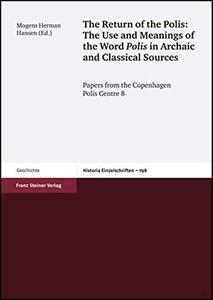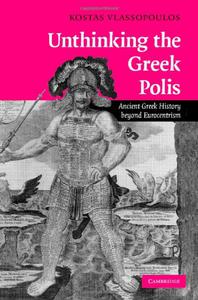
Free Download The Return of the Polis: The Use and Meanings of the Word Polis in Archaic and Classical Sources (Historia - Einzelschriften) by Mogens Herman Hansen
English | December 31, 2007 | ISBN: 3515090541 | 276 pages | PDF | 2.00 Mb
Polis, in plural poleis, is the word the ancient Greeks used to describe their principal type of state and community and the most common of all nouns in ancient Greek. In Archaic and Classical sources there are over 11,000 attestations of the word, and they show that it was used in two different senses: (1) town (sometimes including the hinterland) and (2) state (sometimes including the territory). Often it carries both senses simultaneously and denotes both the state and its urban centre. The Copenhagen Polis Centre (1993-2005) conducted a number of investigations into the use and meanings of the term polis in all Archaic and Classical sources to find out what the Greeks thought a polis was. The present volume is a thoroughly revised and updated comprehensive publication of all these studies, to which four new studies have been added. They show that the two different meanings of the word polis are connected through their reference: with very few exceptions every polis town was the urban centre of a polis state, and conversely: virtually every polis state had an urban centre called a polis in the sense of town.
Полная новость

Kostas Vlassopoulos, "Unthinking the Greek Polis: Ancient Greek History beyond Eurocentrism"
English | 2011 | ISBN: 0521188075 | PDF | pages: 304 | 2.2 mb
This 2007 study explores how modern scholars came to write Greek history from a Eurocentric perspective and challenges orthodox readings of Greek history as part of the history of the West. Since the Greeks lacked a national state or a unified society, economy or culture, the polis has helped to create a homogenising national narrative. This book re-examines old polarities such as those between the Greek poleis and Eastern monarchies, or between the ancient consumer and the modern producer city, in order to show the fallacies of standard approaches. It argues for the relevance of Aristotle's concept of the polis, which is interpreted in an intriguing manner. Finally, it proposes an alternative way of looking at Greek history as part of a Mediterranean world-system. This interdisciplinary study engages with debates on globalisation, nationalism, Orientalism and history writing, while also debating developments in classical studies.
Полная новость
